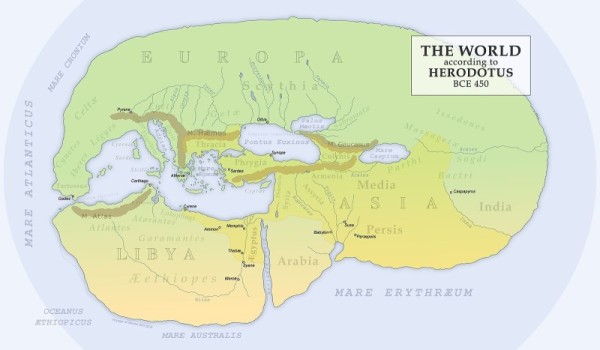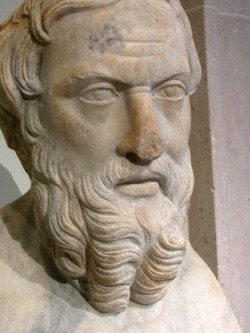Now there is a plain in Asia bounded by mountains on all sides, and through the mountains there are five clefts.

Translated by George C. Macaulay — our special project presenting the complete Herodotus with URLs for all of those people, places, events, and things which baffles and discourages modern readers.
Previously on Herodotus
112. Gum-mastich however, which the Arabians call ladanon, comes in a still more extraordinary manner; for though it is the most sweet-scented of all things, it comes in the most evil-scented thing, since it is found in the beards of he-goats, produced there like resin from wood: this is of use for the making of many perfumes, and the Arabians use it more than anything else as incense.
113. Let what we have said suffice with regard to spices; and from the land of Arabia there blows a scent of them most marvelously sweet. They have also two kinds of sheep which are worthy of admiration and are not found in any other land: the one kind has the tail long, not less than three cubits in length; and if one should allow these to drag these after them, they would have sores from their tails being worn away against the ground; but as it is, every one of the shepherds knows enough of carpentering to make little cars, which they tie under the tails, fastening the tail of each animal to a separate little car. The other kind of sheep has the tail broad, even as much as a cubit in breadth.
114. As one passes beyond the place of the midday, the Ethiopian land is that which extends furthest of all inhabited lands towards the sunset. This produces both gold in abundance and huge elephants and trees of all kinds growing wild and ebony, and men who are of all men the tallest, the most beautiful and the most long-lived.
115. These are the extremities in Asia and in Libya; but as to the extremities of Europe towards the West, I am not able to speak with certainty: for neither do I accept the tale that there is a river called in Barbarian tongue Eridanos, flowing into the sea which lies towards the North Wind, whence it is said that amber comes; nor do I know of the real existence of “Tin Islands” from which tin comes to us: for first the name Eridanos itself declares that it is Hellenic and that it does not belong to a Barbarian speech, but was invented by some poet; and secondly I am not able to hear from any one who has been an eye-witness, though I took pains to discover this, that there is a sea on the other side of Europe. However that may be, tin and amber certainly come to us from the extremity of Europe.
116. Then again towards the North of Europe, there is evidently a quantity of gold by far larger than in any other land: as to how it is got, here again I am not able to say for certain, but it is said to be carried off from the griffins by Arimaspians, a one-eyed race of men. But I do not believe this tale either, that nature produces one-eyed men which in all other respects are like other men. However, it would seem that the extremities which bound the rest of the world on every side and enclose it in the midst, possess the things which by us are thought to be the most beautiful and the most rare.

CC BY-SA 2.0 image from Wikipedia.
117. Now there is a plain in Asia bounded by mountains on all sides, and through the mountains there are five clefts. This plain belonged once to the Chorasmians, and it lies on the borders of the Chorasmians themselves, the Hyrcanians, Parthians, Sarangians, and Thamanaians; but from the time that the Persians began to bear rule it belongs to the king. From this enclosing mountain of which I speak there flows a great river, and its name is Akes. This formerly watered the lands of these nations which have been mentioned, being divided into five streams and conducted through a separate cleft in the mountains to each separate nation; but from the time that they have come to be under the Persians they have suffered as follows:—the king built up the clefts in the mountains and set gates at each cleft; and so, since the water has been shut off from its outlet, the plain within the mountains is made into a sea, because the river runs into it and has no way out in any direction. Those therefore who in former times had been wont to make use of the water, not being able now to make use of it are in great trouble: for during the winter they have rain from heaven, as also other men have, but in the summer they desire to use the water when they sow millet and sesame seed. So then, the water not being granted to them, they come to the Persians both themselves and their wives, and standing at the gates of the king’s court they cry and howl; and the king orders that for those who need it most, the gates which lead to their land shall be opened; and when their land has become satiated with drinking in the water, these gates are closed, and he orders the gates to be opened for others, that is to say those most needing it of the rest who remain: and, as I have heard, he exacts large sums of money for opening them, besides the regular tribute.
118. Thus it is with these matters: but of the seven men who had risen against the Magian, it happened to one, namely Intaphrenes, to be put to death immediately after their insurrection for an outrage which I shall relate. He desired to enter into the king’s palace and confer with the king; for the law was in fact so, that those who had risen up against the Magian were permitted to go in to the king’s presence without any one to announce them, unless the king happened to be lying with his wife. Accordingly Intaphrenes did not think it fit that any one should announce his coming; but as he was one of the seven, he desired to enter. The gatekeeper however and the bearer of messages endeavored to prevent him, saying that the king was lying with his wife: but Intaphrenes believing that they were not speaking the truth, drew his sword and cut off their ears and their noses, and stringing these upon his horse’s bridle he tied them round their necks and so let them go.
– Herodotus, Book III
| <—Previous | Master List | Next—> |
Herodotus made his living by being interesting. In a world where most people did not read and could not afford to buy a book even if they could, they would pay to listen to Herodotus recite from his books. They would not pay to be bored. In that world, the names that populate his stories would have some general familiarity to his audience. Their obscurity to us is a barrier that this series seeks to break down.
MORE INFORMATION
MAP LIBRARY
Because of lack of detail in maps as embedded images, we are providing links instead, enabling readers to view them full screen.

Leave a Reply
You must be logged in to post a comment.